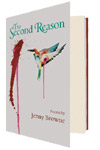Given her favorite subjects—politics, pregnancy, parenthood, child language acquisition, city life and city planning, girls’ and women’s basketball—I might well admire Jenny Browne’s poetry even were her phrasings less fluid, her transitions less surprising, her lines less varied than they are. Poets find their first readers for many reasons. They last, though, only when—like Browne—they do memorable things with words.
Though it all sounds contemporary, demotic, American, Browne’s work catches an unusual formal variety within her spoken voice. Here are page-long stichic exclamations just this side of performance poetry; numbered sets of laconic observations; stanzas thin and bright as mica chips; poems shaped, and poems unshapely; sentences slowly sprawling and sentences anxiously clipped; and a poker hand’s worth of prose poems, some staccato, some legato. Memories of teen anxieties are, in one prose poem named for a first teen crush, “hang-ups and hang-nails knotted into a hair shirt to wear on the can’t take it back tightrope, little failures squirreled cozy and deep.” (Publishers should—this one didn’t—print prose poems both right- and left-justified: not Browne’s fault.) In one poem of childhood memories, fluid associations, and lengthy clauses, a visit to an elementary school class brings back “the feeling of being… small and learning / how to spell February and lightning.” In a poem of short takes, adult life, and quiet wisdom, “Marriage” is “the sign you tape to the trees: / please be careful with me.”
Browne excels by switching between modes—dreamt and waking, associative and memoiristic—not only among her poems, but within them: a poem set during her pregnancy declares “that blood is the sister of green,” then asks “why / all the parades are followed by women / with brooms.” A poem about motherhood highlights the transition from dream-logic to reported events by using parallel constructions: “If you’re not with us, you’re dew. / If you’re dew, you disappear. // If you’re me this week, you see / a baby learn she has hands.” She can recall the Irish poet Medbh McGuckian (and, perhaps, American peers such as Larissa Szporluk) in her quiet layers of slippery non sequiturs: “The day makes a map of disappearing / and the ants need a bridge / for carrying crumbs twice their size.” Yet Browne can also suggest smart, hip “mainstream” fiction (e.g. Alice Mattison), in the concision of her alert realism: a side street in summer, a gym, Galveston Bay.
Set beside contemporaries whose poems consist largely of alienated critique, Browne stands out for her ordinary affections; set beside more populist writers who proclaim their ordinariness, she stands out (and evades sentimentality) because her reactions to her life remain so strange. Clichés get revivified when she encounters instances: “to err is human” becomes, in “On the Bus,” “To know the human is to know the stumble, the please / Keep your fingers and toes inside.” To her fetus, “Little Fishy Thing,” she says “Come on little dawn, you half / comma hiccuping homeward.” If you think such lines fey to a fault, you may not like her work. If they delight or move you, you surely will. Her poems retain the unpredictability not of a roulette wheel or a supernova, but of a quirky, wise friend in another city, one whose reactions surprise us even once we know her enough to trust her well.
Format: 86 pp., paperback; Size: 8″ x 5 1⁄2“; Price: $12.00; Publisher: University of Tampa Press; Poet’s description of “how to make a piñata,” from a short story of the same name: “Whatever shape I want starts with a balloon”; Poet’s unlikely hero: “That mother of five in Queens // who has become so skilled at this / particular removal of nit that they come / knocking from Jersey”; Places described in poet’s prior writings: Bolivia, Sierra Leone, Austin, TX; Place described in this book: San Antonio, TX; Representative line: “see how the squirrels chew with their mouths open, scattering / green pecan pieces on our big ideas.”





